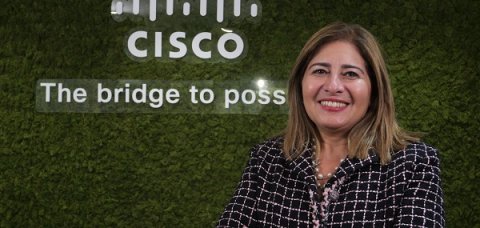Reem Asaad, Vice President, Cisco Middle East and Africa, tells Anita Joseph how the company is driving digital transformation with its commitment to innovation, resilience and sustainability.

Digitization is a trending topic. Can you discuss Cisco’s initiatives in building a resilient digital economy?
Digitization is indeed a prominent topic today, encompassing aspects like digital transformation, AI, cybersecurity, and cloud computing. Cisco has been in the UAE for over two decades, and we’ve made significant investments. We have a strong local presence and valuable partnerships with governments, customers, and partners. We’ve been primarily focusing on five key pillars to support our customers:
Application Transformation: With the rise of digital transformation, there’s a need to re-imagine applications. COVID-19 accelerated this shift, emphasizing the importance of applications as the lifeblood of businesses and governments. We’re helping customers adapt to various application types, be it public cloud, hybrid cloud, consumed as a service, or cloud-native. The goal is to make applications more efficient and effective, catering to government, citizen, or business services.
Resilient Infrastructure: As applications become distributed, the infrastructure must be robust. We’ve integrated AI into our network solutions, allowing customers to build AI-driven networks. This ensures efficient and secure network operations, a critical part of adapting to evolving digital needs.
Hybrid Work Environments: The way we work has transformed, with many people working from home. Cisco is committed to ensuring a seamless experience, no matter where you work. This includes features like noise-canceling for video calls to enhance collaboration and inclusivity.
Cybersecurity: The evolving threat landscape demands robust cybersecurity. We’ve incorporated AI-powered cloud security into our offerings to safeguard the network from any entry point, be it from the cloud, the office, or remote locations. Ensuring the security of data and networks is crucial.
Sustainability: In line with the digitization journey, we’re also focused on sustainability. Cisco is actively helping customers transition to sustainable solutions, offering clean and green energy options, promoting circular economy practices, and building resilient ecosystems.
How is Cisco enabling the next generation to keep up with emerging trends, particularly in AI?
Skill development is a significant challenge. Digital skills are critical, but there’s also a need to equip individuals with the skills to responsibly manage and implement AI. A significant gap exists in the market, and reports indicate that up to 60% of jobs will require retraining in the next four years. At Cisco, we have established the Cisco Networking Academy to address this challenge. We collaborate with universities to offer future-focused skills, including AI, cybersecurity, programmability, and business skills. In the Middle East and Africa, we’ve trained over 3.3 million learners till date, with 105,000 in the UAE alone, ensuring that technology is accessible and utilized responsibly.
How are security imperatives evolving in the digital era, and what about governance and cybersecurity laws?
Security has become a central concern for businesses and governments. To effectively manage cyber threats, there’s a need for robust security policies, leveraging AI-powered detection, and resilient infrastructure. Cisco is at the forefront of these changes, offering intelligent, AI-driven cloud security solutions. These solutions ensure that the network remains secure, no matter the entry point. The focus on security is not only part of our network but also embedded into our hardware, software, and data management systems. Cybersecurity laws and policies play a pivotal role, and they are continually evolving to address the challenges of the digital era.
With COP 28 approaching, how can businesses ensure their actions have a positive impact on society, especially regarding sustainability?
Sustainability is a key focus, even in regions rich in natural resources like the Middle East. Sustainability is now a central discussion in boardrooms. Cisco is actively assisting customers in transitioning to sustainability in three key areas:
Clean and Green Energy: We help businesses use clean energy in their solutions, promoting eco-friendly practices.
Circular Economy: Embracing a circular economy approach, where products are designed for reuse and recycling, to reduce waste.
Resilient Ecosystems: Building a resilient ecosystem to support sustainability efforts, ensuring that the entire system is sustainable.
We also help customers identify key performance indicators (KPIs) and implement technology roadmaps to reach sustainability goals. Data management and analytics play a critical role in measuring progress. We also emphasize choosing the right partners to navigate this sustainability journey effectively. Cisco is committed to sustainability and aims to be net zero by 2040, focusing on reducing emissions and removing what’s left from the environment.
Can you share some highlights from GITEX, any important announcements or partnerships?
GITEX is the landmark event in the region and beyond. We’ve established numerous partnerships with leading companies. It’s the ideal platform to showcase our innovations and the collaborative efforts of our partners. We are dedicated to advancing the industry and creating a more sustainable and digitally resilient future.





